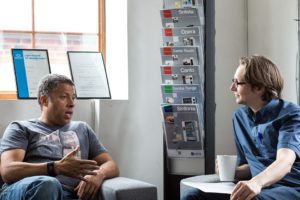How to answer job interview questions? : Interviews are the toughest ones to ace for many job seekers. Afterall, this is the ultimate test that checks your all round growth and development, presence of mind in the direst of situations, leadership skills and the ability to communicate in a coherent manner. It is just like your personality test that truly reflects you as an individual. Basically, an interview is a two way interaction between the interview panel and the prospective candidate.
Now, it is essential to understand that possessing only bookish knowledge is not suffice. Your to-be employers are looking for personality traits which will be useful for their organization. This is precisely the reason why interviews are deemed to be an integral part of the recruitment process. It is a good method to know about the intellectual level of an individual. From the point of view of the interviewee, an interview helps him make up his mind about whether or not he is really interested in taking up that particular job.

Types of Interviews
Before moving ahead, we must have an understanding of the different types of Interviews which will assist you in preparing accordingly. These are discussed below:
1. Telephone Interview
Before inviting you straightaway for a walk-in interview, some companies may prefer to have a personal communication with you over the telephone. This can turn out to be advantageous for the candidate as you don’t have to go through the tedious process of dressing up formally or taking care of your looks. You can even have your notes in front of you which probably will help you a great deal.
2. Face-to-Face Interview
This involves a personal interaction between you and one or two members of the staff selection committee in person.
3. Panel Interview
Basically, this type of interview involves more than two interviewers (belonging to the organisation) who will put up questions in order to gain an insight into your personality. Sometimes, the interview panel may even consist of experts from outside the organisation which enables the management to take well informed hiring decisions.
4. Group Interview
This type of interview is more like a group discussion that puts your listening, speaking and leadership qualities to test. It is an effective method to assess your body language.
5. Sequential Interview
Under these kinds of interviews, you have to go through multiple sets of interviews each time with a different interviewer. Main aim of the sequential interview is to test your different sets of competencies and skills.
6. Lunch/Dinner Interview
This type of Interview tests not only your interpersonal skills but also your eating etiquettes. So make sure not to annoy the interviewers by spilling your drink (which must be non-alcoholic ofcourse) or ordering something that is considered unwise.
7. Formal/Informal Interviews
Some interviews may be strictly formal and follow a well defined structure, while others may be just a fun chat about your interests and hobbies. So make sure you are honest about all this stuff in your application and resume as well.
Click Here: Best Career Tips
How to answer job interview questions?
Since now you are well aware about what are the various sorts of interviews, it is time to brace yourselves for facing interviews. To know about “How to answer job interview questions?” read the below mentioned points. Here are 10 crucial things you need to keep in mind while answering job interview questions:
1. Know well about the company as well as the job you are applying for
Undoubtedly, it is important to research well about the organization you have applied to (by trying to gather some vital information regarding top executives, strategic objectives of the company etc.), but at the same time it is equally important to know what the job demands of you and how you will deal with every possible task that is assigned to you.
 This will serve as an added advantage for you and may fetch you some extra points.
This will serve as an added advantage for you and may fetch you some extra points.
2. Try to be Professional
It is very essential to dress up according to the norms of the organization so as to exhibit professionalism and devotion to your work. Avoid overdone looks or wearing heavy makeup. Sticking to the rules of the company will create a good impression on the Interviewer.

3. 7 C’s of Effective Communication
In order to communicate effectively during the interview, you must be aware of the 7 C’s of Communication which are:
- Completeness (which simply means that your communication must be complete and you don’t miss out on vital information),
- Conciseness (conveying your message precisely in a comprehensible manner),
- Consideration (your words must be appealing to the audience in such a way that they can easily relate to what you are saying),
- Clarity (make use of your words judiciously and in an understandable manner),
- Concreteness (be specific and to the point. Try to support your points with facts and figures),
- Courtesy (be polite and address your interviewers by making use of respectable words),
- Correctness (make sure your language skills are on point and you don’t make any grammatical errors).
 Click Here: How to improve communication skills?
Click Here: How to improve communication skills?
4. Prepare yourself for General Questions
There are some popularly asked questions like ‘Tell me about yourself’, ‘Why should we hire you?’, ‘What makes you unique?’, ‘What are your interests?’, ‘What motivates you?’, ‘What are your goals, strengths and weaknesses?’ for which you must prepare your answers in such a way that they stand out in the crowd and create a lasting impression on interviewer’s mind. For example, if an interviewer asks you to describe yourself, be brief about your characteristics, plus points, weaknesses and qualities.
 Do not go on and on bragging about your educational qualifications and degrees. Interviewers can easily get to know about them by having a look at your resume. Hence, try to enlighten them regarding your persona and various skills your possess.
Do not go on and on bragging about your educational qualifications and degrees. Interviewers can easily get to know about them by having a look at your resume. Hence, try to enlighten them regarding your persona and various skills your possess.
5. Practice Well
Be well prepared with unique and good quality answers to some of the routine questions asked by the interviewers. Don’t mug up your answers. Just be mentally prepared with basic points that you should ideally include in your response.
 You can practice speaking in front of the mirror or your friends and family. This will definitely pay off during your interview.
You can practice speaking in front of the mirror or your friends and family. This will definitely pay off during your interview.
6. Relax and Stay Confident
Try to get a proper sleep (upto 6-8 hours) one night before the D-Day. Have a nourished meal and relax your brain. Do not lose your confidence even if you don’t know the answer to any particular question because this is what matters more than your correct response.

7. Be Honest
Try to be truthful in your answers. Don’t fake anything. Even if you don’t have any past experience or something like that, be completely honest about that. Remember: You must not hesitate in staying candid and original.

8. Avoid these mistakes
Do not arrive late for the interview. Do not be rude. Treat everyone with respect.You must not speak ill of your former employers or colleagues. Avoid making inappropriate jokes or dominating the conversation.

9. Imbibe Positivity
Stay around those who exude positive vibes. Try to boost the confidence level of those nervous.

10. Stay Observant
Once you enter the interview premises, be observant of even the tiniest of things around you. Who knows when this may come in handy!
 So these were some of the interview hacks that may help you in successfully getting past this hurdle. Try to deal with all the stress with a cool head. Believe me, you will have better thoughts and ideas. All the best to all those who may be sitting for interviews in future. Hope you find this article enriching and resourceful. Thank you.
So these were some of the interview hacks that may help you in successfully getting past this hurdle. Try to deal with all the stress with a cool head. Believe me, you will have better thoughts and ideas. All the best to all those who may be sitting for interviews in future. Hope you find this article enriching and resourceful. Thank you.
Author: Manasvi Nagpal

